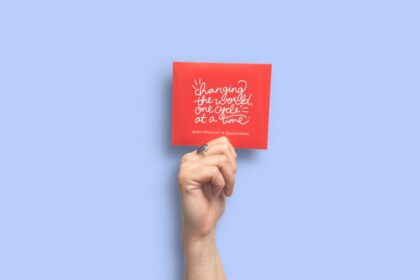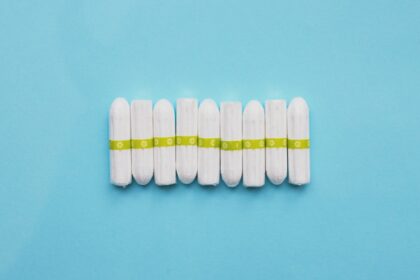Seven life hacks to help you feel better on your period
Frump? Crampy? Bloated? Craving chips and chocolate? You’re probably menstruating! Read seven life hacks to help you feel better on your period.
As the famous quote goes: “Nothing is certain but death and taxes”. If you’re a woman of a certain age, then you can often add: “And monthly periods”.
Don’t mind them or loathe them, for most women between the ages of around 11 and 50, the monthly period is an inevitability. And with it comes the joy of PMS, cramps and bloating. And for many women, there’s no worse pain than menstrual cramps.
But if you suffer badly from menstrual symptoms every month, we have good news: there’s a lot you can do to help ease them. Let’s look at seven life hacks that may just help you feel better on your period.
1) Eat chocolate
If there is one time when you deserve permission to eat chocolate, its when you’re on your period, or just before it. After all, it’s not your fault that you crave it – apparently it’s partly caused by hormone fluctuations.
But if you are going to give into your chocolate cravings, try to keep it least a little bit healthy, and opt for dark chocolate.
Good quality dark chocolate with a high percentage of cocoa solids is one of the nest sources of antioxidants. It’s also apparently high in iron, magnesium, copper and manganese.
So if eating a little dark chocolate when you’re on your period makes you feel better, then go for it. Just make sure you keep your snacking in moderation and don’t use it to replace healthier foods.
Not a chocolate fan? If you’re tempted to snack on your period, try to avoid salty snacks and caffeine, and instead consume potassium-rich food as much as you can.
2) Track your periods (and be prepared)
If you’re lucky enough to have a regular 28-day cycle that is consistently reliable, then you’re probably prepared for your period every month. You’re also in a small minority – according to research only 13% of women are in that camp.
If you’ve lived with an irregular for years then you’ll know the importance of being prepared for it to come at any time. While tracking your cycle using an old fashioned diary or an modern app can help give you a rough idea of when it might come, you never really know the exact moment it can come on.
So it’s important to have an easy-to-carry period kit with you during the window in which your period is likely to arrive. And do stay on top of tracking your period so you know when you need to be prepared, and watch out for signs. Some apps alert you when your period could come.
3) Get enough sleep
The menstrual cramps fatigue is a real deal, and it may increase your pain too. So go with your body’s instinct and get as much sleep as you can, or need, when you are on your period.
That means going to bed early, if you feel like it, and getting your eight hours of quality sleep a night. And take a power nap of between 10 to 20 minutes during the day if possible. You’ll be amazed at how energized and motivated you can feel after just a short rest.
If you’re feeling discomfort, then fill up a hot water bootle and let it soothe your menstrual cramps. It’s a cheap and easy, time-tested pain reliever during your period.
Apparently, the reason why we get stomach cramps is because our muscle tissue lacks oxygen. Heat from a hot water bottle or heating pad will stimulate blood flow, and help to ease symptoms.
4) Drink plenty of water
During your period you can experience water retention and bloating. And while it may seem counterintuitive, the best way to combat this is to drink plenty of water!
The reason for this is because, as your estrogen and progesterone levels decline during menstruation, your body retains more water. This can affect your digestive system and causes constipation, gas, and bloating.
Drinking at least eight glasses of water a day during your period will help to beat the bloat and flush any waste from your body. It will also help you feel more hydrated (which helps with energy levels) and fresh.
While we’re on the subject of drinking, try to avoid alcohol before and during your period.
A study in the BMJ Open journal found that alcohol intake was associated with a ‘moderate’ increase in the risk of PMS. It learned that people who drank alcohol were 45% more likely to suffer PMS symptoms than non-drinkers. And this rose to 79% for heavy drinkers.
Alcohol also makes you feel dehydrated, and can make your cramps worse as a result. So as tempting as it might be to console yourself with a glass of wine when you’ve got your period, it might just make you feel worse.
5) Eat healthily
During your period you need to be careful about what you eat, as some foods might increase your discomfort and pain.
So while you might crave fatty, salty fast food, try to fight your urges and instead choose healthier food like fruits and vegetables or salads, and high quality proteins and fats, like fish, chicken nuts and avocados. Your body needs plenty of hydration, nutrients and energy – all things that processed, salty, high-fat foods can’t offer.
Fruits and vegetables in particular are a vital source of nutrients and fiber, which makes them especially helpful during menstruation. A 2018 study in Spain found that vegetarian diets and eating more fruit and vegetables led to fewer cramps and reduced menstrual pain.
Another 2012 study investigated the effect of omega-3 supplements on the intensity of menstrual pain in women aged 18–22. It discovered that omega-3 group helped to significantly reduce the intensity of period pain.
Food rich in omega-3 includes:
- Salmon
- Tuna
- Sardines
- Mackerel
- Flaxseed and flaxseed oil
- Chia seeds
- Walnuts
- Fortified foods, including some yogurts and juices
As you lose blood during menstruation, your iron levels dip. So it’s important to include into-rich food in your diet during your period. Indeed, a 2013 study found that women who consumed iron from plant foods had fewer menstrual-related symptoms.
Foods that are high in iron include:
- Oysters
- Red meat, such as beef and beef liver
- Fortified breakfast cereal
- Tofu
- Nuts
- Beans and lentils, including chickpeas and kidney beans
- Spinach
- Sardines
- Dark chocolate
6) Wear comfort clothes
The last thing you want when you are already feeling bloated, crampy and generally bleurgh during your period, is to squeeze yourself into tight, uncomfortable outfits. Instead, choose clothes that make you feel comfortable and comforted.
You also don’t want to wear items like skin-tight white leggings – for obvious reasons! The best items to wear on your period are the ones that make you feel good. So go for soft fabrics with a generous cut, and choose darker colours that will hide any leaks and wash easily.
7) Get some exercise
You might feel like just curling up on the sofa with a bar of chocolate and a weepy film, but the best thing you can do when you’ve got your period is to exercise.
According to numerous studies, exercise can lift your mood, boost your energy levels and even reduce menstrual pain. That said, you need to be careful about what kind of exercise you do.
Gentle stretching exercises, such as yoga, Tai chi, and Pilates, can help to ease your muscles and help with cramping. And many people find that swimming helps reduce painful period pain. Light walking and short bouts of aerobic exercise is also good.
But don’t push yourself too hard. Now is not the time to go for a personal best. Instead, take it easier and listen to your body. You also need to avoid some yoga poses when you are menstruating, including boat pose, legs up the wall and headstand.
Take care of yourself during your period
The main advice to help make your periods as pain-free and easy as possible is just to take care of yourself.
As you can see, much of the advice above is common sense: eat and sleep well and get gentle exercise. As much as it may be tempting to ‘treat’ yourself and abandon any healthy habits, the short term enjoyment will come with a heavier cost in potentially increased symptoms, tiredness and low mood.
So comfort yourself with your favourite loungewear, and curl up with a movie and dark chocolate, but balance it out with plenty of water, healthy meals and a short walk or gentle yoga exercises. And indulge in an afternoon nap if you feel like it – it’s virtually doctor’s orders!










